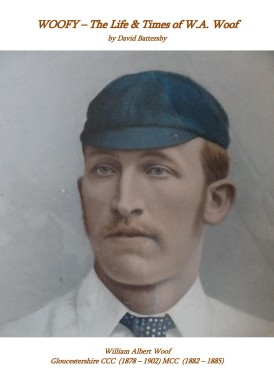Woofy : The Life & Times of WA Woof
Martin Chandler |Published: 2018
Pages: 182
Author: Battersby, David
Publisher: Battersby, David
Rating: 3 stars

The increase in self publishing is one of the more welcome trends in publishing, and Woofy is David Battersby’s sixth such venture, albeit the first that can properly be described as a book, as opposed to a booklet. Like his five previous efforts, and indeed his first book, In The Shadow Of Packer (for which he had the support of a publisher) the subject matter is well off the beaten track of cricket literature and to be welcomed for that alone.
As its subtitle makes clear Woofy is a biography, and its subject is a long forgotten Gloucestershire bowler. Woof was originally born in Gloucester itself although he moved around the country for a number of years before returning to the county of his birth, more specifically Cheltenham, where lived he died at the age of 78 in 1937. Why Battersby, whose previous work tends to demonstrate a greater interest in Pakistani cricket than any other aspect of the game, should dwell on the life of a Victorian county cricketer is easily explained. He lives in Cheltenham, and his interest follows on from that.
Without a special interest in Gloucestershire even those of us who consider ourselves well read on the subject of nineteenth century cricket will struggle to find too much in the forefront of our minds about William Woof. The name does ring a vague bell, and that he was a decent player is clear from his record, a career haul of 754 wickets at 17.73 being testament to that. But he never played for England, nor indeed for the Players.
I suppose it must have been possible when Battersby began his research that there might, somewhere, have been someone alive who knew Woof, but it was always going to be a long shot, and anyone who he did find could only have known Woof during their childhood. In fact there was no one, although Battersby did find a great grandson who contributes the briefest of forewords. Sadly he did not know his great grandfather, nor it seems did he know very much about him, but he must have been of assistance to Battersby in putting some of the information he uncovered elsewhere in its proper context. What the family did retain were a number of photographs, and the regular appearance of these within the narrative is one of the book’s strength.
The best biographies do not follow a simple chronological path through their subject’s lives, and a good cricketer’s life does not dwell too much on the description of the matches in which he played. These are points I have made many times before, and applying them here would mean I would have to conclude that Woofy was a disappointing book. In truth however it is more a case of Woofy being the exception that proves the rule, as I cannot really see how, given the material available, the book could have been written differently.
What Battersby has done is scoured the local, national and cricketing press for everything he can find about Woof, and arranged that research in chronological order. Much of course relates to performances on the cricket field, and it is only by looking at those that the message is reinforced as to just how dependent Gloucestershire were in Woof’s time on the Grace family. Time and again the scorecards disclose no one other than WG,EM, GF and their cousin WR Gilbert whose names mean very much. At the start of Woof’s career the Australian Billy Midwinter figures occasionally, but his apart the few other names I recognised were dredged up from the back of my mind with little or no supporting detail accompanying them. It is perhaps for that reason alone, and the consequent realisation as to how important a performer Woof actually was, that these reports are more interesting than they might have been. The quality of the writing helps as well of course.
In addition to Woof’s cricket Battersby has also uncovered a good deal about the man himself that makes his life rather more interesting than that of a man who history discloses was simply a paid cricketer. There were some interesting forebears, and Woof’s immediate family was tainted by tragedy as well as disgrace. In addition to his playing duties Woof was also a coach at Cheltenham College, and in South Africa, and both during and after his playing career he was a successful businessman running a number of sports outfitters in the area.
Inevitably there are frustrations, and in particular it would have been interesting to know a bit more about Woof’s business activities, but the files that Battersby would have needed to unravel those were doubtless destroyed generations ago. The personality of the man himself also remains elusive although the reports of his personal bankruptcy early in the Great War contains some clues.
All in all Woofy is a thoroughly worthwhile attempt to generate some interest in one of our game’s forgotten worthies. Battersby could also usefully offer his services to anyone seeking advice on self-publishing. Woofy is a nicely presented limited edition of 120 copies, and whilst this reviewer has his doubts about the benefit of having a separate index which is therefore vulnerable to attempts at it being used as a coaster by one’s spouse, the manner in which the photographs so kindly provided by the great grandson have been reproduced is most impressive.






Leave a comment